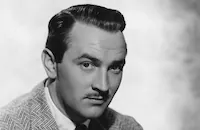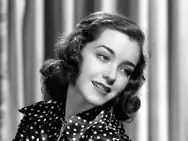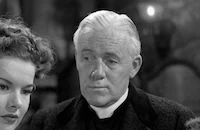Smash Up, The Story of a Woman

Brief Synopsis
The ballad wins Ken acclaim, and soon he is promoted to his own show in an evening time slot. As Ken's popularity soars, Angie cloisters herself at home with the baby. Angie's confidence is further eroded by her husband's new prominence. When Ken buys an exclusive apartment equipped with servants' quarters, and expects Angie to host glamorous social gatherings, she becomes even more insecure and again turns to drink. Ken's secretary, Martha Gray, gladly supplants Angie as Ken's hostess, causing Angie to seek further solace in a bottle. Ken's busy life leaves no time for a dependent wife, and when he invites Martha to join him and Angie and on a concert tour to Chicago, Angie, insecure, gets drunk and Ken leaves without her. While Ken is away, the baby falls critically ill with pneumonia, and Angie forswears drink and spends sleepless nights caring for the child until the crisis is over.
Afterward, when Angie calls Ken at his hotel room, and Martha answers the phone, Angie's self-esteem is totally shattered and she again turns to drink. Ken hurries home to be home with his sick daughter, but when he finds Angie drunk, he becomes disgusted and returns to Chicago. Years pass and Angie, now a chronic alcoholic, sinks into the depths of despair. Urged by Steve to be more understanding of Angie, Ken decides to give a party in his wife's honor. At the party, Martha deliberately arouses Angie's jealousy, causing Angie to assault her in a drunken rage. Although Angie expresses remorse for her behavior, Ken, disgusted, files for divorce and seeks custody of their daughter. Rejecting Ken's offer of the apartment and a generous alimony settlement, Angie moves into a hotel, and with Mike's help, tries to rekindle her singing career.
Remaining loyal to Angie, Steve confronts Martha when she begins to date Ken, causing her to break into tears and admit that she harbors an unrequited love for Ken. Refused visitation rights with her daughter, Angie continues to drink and one night passes out in the street. Upon awakening, Angie drives to see Angelica and kidnaps the girl from her nurse, Miss Kirk. After putting Angelica to bed, Angie drunkenly drops a lit cigarette on the floor, then leaves the room. Awakened by Angelica's screams, Angie dashes into the flames of the now burning house to rescue her daughter. Although Angelica is uninjured, Angie is badly burned. At the White Memorial Hospital, as Angie regains consciousness she cries for her child. Ken is at her bedside, and after Dr. Lorenz finally makes him comprehend Angie's desperation, Ken reconciles with his wife who then recovers with renewed self-reliance and strength.
Cast & Crew
Stuart Heisler
Susan Hayward
Lee Bowman
Marsha Hunt
Eddie Albert
Carl Esmond
Film Details
Technical Specs

Synopsis
A singer's wife turns to the bottle when she fears she's lost her husband to success.

Director

Stuart Heisler
Cast

Susan Hayward

Lee Bowman

Marsha Hunt

Eddie Albert

Carl Esmond
Carleton Young

Charles D. Brown
Janet Murdoch
Sharyn Payne

Robert Shayne
Larry Blake

George Meeker
Erville Alderson
George Meader
Ruth Sanderson
Steve Olsen
Fred Browne
Barbara Wooddell
Cecile Elliott
Alice Fleming
John Wald
James Craven
Frances Morris
Connie Leon
William Gould
Vivien Oakland
Robert Verdaine
Laurie Douglas
Chuck Flynn
Eddie Coke
Paul Bradley
Eddie Randolph
Sherry Hall
George Ramsey
John Valentine
Ernie Adams

Ethel Wales
Ralph Brooks
Carol Andrews
Caren Marsh
Ralph Montgomery
Doug Carter

Noel Neill
Cay Forrester
Lee Shumway
Wilbur Mack

Bess Flowers
Beatrice Gray
Jeffrey Sayre
Joe Recht
Phil Garris
David Mckim
Martin Gable
Joan Fulton
Virginia Carroll
Nanette Vallon
Dorothy Christy
Al Hill
Richard Kipling
Clarence Straight
Crew
Harold Adamson
Daniele Amfitheatrof
Travis Banton
Jack Brooks
Milton Carruth
Frank Cavett
Stanley Cortez
Carmen Dirigo
Edgar Fairchild
Charles Felstead
Fred Frank
Martin Gabel
Russell A. Gausman
Alexander Golitzen
David S. Horsley
Peg La Centra
Joe Lapis
John Howard Lawson
Ruby Levitt
Jimmy Mchugh
Dorothy Parker
Jack P. Pierce
Frank Skinner
David Tamkin
Walter Wanger
Lionel Wiggam

Photo Collections
Videos
Movie Clip



Hosted Intro
Film Details
Technical Specs

Award Nominations
Best Actress
Best Writing, Screenplay
Articles
Smash-Up: The Story of a Woman
This was Hayward's first major role, and it immediately established the actress in her hallmark character, that of the downtrodden woman struggling to make a comeback. Hayward burst forth in post-WWII Hollywood with a series of strong, vivid performances that some considered overbearing and histrionic, but which helped establish her suffering but resilient screen persona. She played an alcoholic twice more in My Foolish Heart (1949) and I'll Cry Tomorrow (1955), was crippled in With a Song in My Heart (1952), and was sent to the electric chair in I Want to Live! (1958). She was Oscar®-nominated every time, finally winning for I Want to Live!.
Smash-Up may not be quite as seamless as The Lost Weekend, but it's still an effective portrait of alcoholism powered by Hayward's strong performance. In fairness, the two movies differed in several regards. As film historian Charles Higham later wrote, Smash-Up "has a soft sheen, a feeling of luxury and almost claustrophobic sumptuousness, in marked contrast to Wilder's relatively faithful realism." It also attempted to give the audience a different kind of experience, starting with its overall look. The movie was shot by one of the great cinematographers of the era, Stanley Cortez, and his work here is superb.
Cortez later recalled an example of his innovative work on this picture: "We had a scene in which the heroine is lying in bed and mumbling. She's having a nightmare, and I went to my doctor to ask him what happens in a person's mind when he is drunk. He told me about the flashing of lights across the brain, and I had lights actually inside the lens. I conducted a kind of symphony of light over her. As she reached a pitch of distress I raised the lights to the highest pitch possible. Susan Hayward helped by actually getting drunk to play the part! I didn't want to do the cliche thing and show her distorted impressions, but rather convey her thoughts with abstract play of lights alone. It was fantastic."
In addition to Hayward's Oscar® nomination, Smash-Up was nominated for Best Original Story (Dorothy Parker and Frank Cavett).
Producer: Walter Wanger
Director: Stuart Heisler
Screenplay: Dorothy Parker (story), Frank Cavett (story), John Howard Lawson, Lionel Wiggam
Cinematography: Stanley Cortez
Film Editing: Milton Carruth
Art Direction: Alexander Golitzen
Music: Jack Brooks, Edgar Fairchild, Jimmy McHugh, Frank Skinner
Cast: Susan Hayward (Angelica Evans Conway), Lee Bowman (Ken Conway), Marsha Hunt (Martha Gray), Eddie Albert (Steve Nelson), Carl Esmond (Dr. Lorenz), Carleton Young (Fred Elliott).
BW-104m. Closed captioning.
by Jeremy Arnold

Smash-Up: The Story of a Woman
Quotes
Trivia
Based on the life of entertainer Dixie Lee (I).
Walter Wanger consulted with the National Committee for Education of Alcoholism and used their suggestions about continued vigilance in the film. Similarly, directorStuart Heisler consulted with authorities on alcoholism.
The PCA tried to dissuade Walter Wanger from making the film, because the subject was recently explored in the movie _Lost Weekend, The (1945)_ and excessive drinking violates the production code. But Wanger convinced them that it is permitted for furthering the plot and characterization, and he was given PCA approval.
Notes
The working title of this film was Smash-Up. A May 1946 Hollywood Reporter production chart places Victoria Horne in the cast, but her appearance in the released film has not been confirmed. Although an August 1946 Hollywood Reporter production chart credits Mark Hellinger as producer, his contribution to the released film has not been determined. Many reviews compare this picture to the 1945 Paramount film Lost Weekend because of its topic of alcoholism. According to a New York Times news item, the PCA initially tried to dissuade producer Walter Wanger from making this picture because the topic had recently been dealt with in Lost Weekend. Using the argument that the code only prohibited the depiction of unnecessary social drinking and that imbibing to further plot and characterization is permitted, Wanger finally won the PCA's approval. To assure authenticity, Wanger consulted with the National Committee for Education of Alcoholism and incorporated their suggestions about the necessity of continued vigilance into the scenario. A Life magazine article adds that director Stuart Heisler consulted with a Yale University authority on alcoholism. A New York Times news item notes that parts of the film were shot on location at Central Park and Sutton Place in New York City. This was screenwriter John Howard Lawson's last assignment before being subpoened by HUAC as one of the Hollywood Ten. (For additional information on HUAC, see entry above for Crossfire.) Susan Hayward was nominated for an Academy Award for Best Actress for her performance in this picture. This was the first of many "long-suffering heroine" roles for Hayward.















